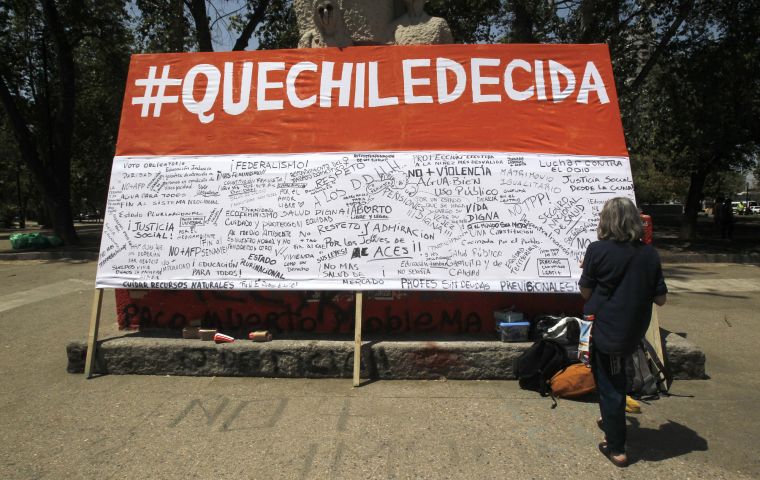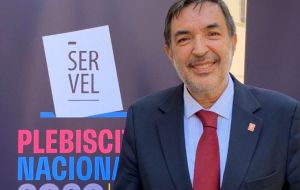MercoPress. South Atlantic News Agency
Chilean referendum campaign to amend Pinochet constitution takes off
 The referendum to decide whether to change the constitution from the military rule of General Pinochet (1973-90) was originally due to take place in April
The referendum to decide whether to change the constitution from the military rule of General Pinochet (1973-90) was originally due to take place in April  “We're all working to hold a safe referendum,” said Patricio Santamaria, the president of the Electoral Council.
“We're all working to hold a safe referendum,” said Patricio Santamaria, the president of the Electoral Council. Braving the pandemic, Chileans begin campaigning on Wednesday for a referendum on amending their dictatorship-era constitution -- for many a symbol of entrenched social and economic inequality.
The referendum to decide whether to change the constitution established under the military rule of General Augusto Pinochet (1973-90) was originally due to take place in April but had to be postponed as the country of 18 million reeled from the deadly virus.
When violent protests broke out last October, one of the key demands of demonstrators pushing for greater social justice was a change to the constitution.
For those supporting a yes vote -- notably the leftist opposition -- a new constitution would allow for the establishment of a new and fairer social order in one of the Latin American countries most marked by economic and other forms of inequality.
Those in favor of a no vote -- essentially conservative groups -- believe that change can occur without tearing up a document that they say helped bring stability to Chile.
On October 25, more than 14 million Chileans will decide whether to amend the constitution. The poll will come more than three decades after an historic 1988 referendum that opened the way for an end to the Pinochet dictatorship and a path towards democracy.
“The most relevant political fact is to remove the legacy of the dictatorship that continues to act like a straightjacket on the possibility of political and social change in Chile,” Claudia Heiss, an academic at the public affairs institute at the University of Chile, commented.
She said a new constitution could open “a conversation that has been closed until now,” such as on the necessity for public policies aimed at redistributing wealth and increasing democratic participation.
On November 15, a month after the social unrest that left 30 dead broke out, the government and opposition parties agreed to hold the referendum.
Voters will face two questions: one on rewriting the constitution and the other on who should do so.
The second question will decide whether existing legislators will join a specifically elected body to write the new charter.
“There are two paths and what I want is that whichever is the chosen path, we arrive at a constitution that effectively recognizes and protects the fundamental rights of Chileans, like the right to life, freedom and equal opportunities,” said President Sebastian Piñera in an interview on Sunday with La Tercera daily newspaper.
There remain fears, though, that the referendum could fuel a surge in coronavirus cases that have stabilized recently, although only after leaving more than 400,000 people infected and 11,000 dead.
“As opposed to what happened in March, now we have a lot more experience in relation to managing the pandemic and we also have the internationally accumulated experience,” Jose Miguel Bernucci, the general secretary of the Medical College, said.
Both the president and Congress have the power to postpone the referendum up to one day before it takes place if the health conditions demand such a move.
“We're all working to hold a safe referendum,” said Patricio Santamaria, the president of the Electoral Council.
The election campaign will primarily take place on social media and radio announcements. A pair of polls this week showed that most Chileans intend to vote, although around half the population fears that by doing so they could catch the virus.




Top Comments
Disclaimer & comment rulesCommenting for this story is now closed.
If you have a Facebook account, become a fan and comment on our Facebook Page!